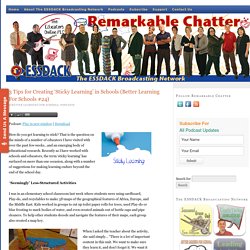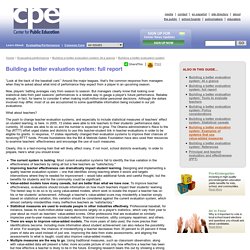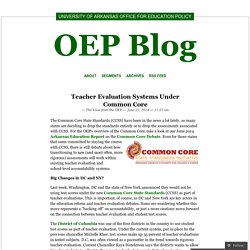

3 Tips for Creating ‘Sticky Learning’ in Schools (Better Learning For Schools #24) - Remarkable Chatter. How do you get learning to stick?

That is the question on the minds of a number of educators I have visited with over the past few weeks…and an emerging body of educational research. Recently as I have worked with schools and educators, the term ‘sticky learning’ has surfaced on more than one occasion, along with a number of suggestions for making learning endure beyond the end of the school day.
‘Seemingly’ Less-Structured Activities I was in an elementary school classroom last week where students were using cardboard, Play-do, and recyclables to make 3D maps of the geographical features of Africa, Europe, and the Middle East. Kids worked in groups to cut up toilet paper rolls for trees, used Play-do or blue frosting to mark bodies of water, and even created animals out of bottle caps and pipe cleaners. When I asked the teacher about the activity, she said simply… “There is a lot of important content in this unit. ‘Getting Out of the Way’ of Student Learning. Planning and Assessment. Usny.nysed.gov/rttt/teachers-leaders/practicerubrics/Docs/nyla-rubric.pdf. Resource Library. Building a better evaluation system: full report. “Look at the back of the baseball card.”

Around the major leagues, that’s the common response from managers when they’re asked about what kind of performance they expect from a player in an upcoming season. Now, players’ batting averages vary from season to season. But managers clearly know that looking over statistical data from past seasons’ performances is a reliable way to gauge a player’s future performance.
Reliable enough, in fact, for teams to consider it when making multi-million-dollar personnel decisions. Although the dollars involved may differ, most of us are accustomed to some quantifiable information being included in our job evaluations. What about teachers? The push to change teacher evaluation systems, and especially to include statistical measures of teachers’ effect on student learning, is here. Clearly, this is a fast-moving train that will likely affect many, if not most, school districts eventually. The current system is lacking. The current system is lacking. Www.centerforpubliceducation.org/Main-Menu/Evaluating-performance/Trends-in-Teacher-Evaluation-At-A-Glance/Trends-in-Teacher-Evaluation-Full-Report-PDF.pdf. Www.air.org/sites/default/files/downloads/report/What_Districts_Are_Spending_to_Implement_Teacher_Evaluation_Systems_Final_0.pdf. More NCLB Waiver States Get Federal Approval for Teacher Evaluations - Politics K-12.
Teacher Evaluation Systems Under Common Core. The Common Core State Standards (CCSS) have been in the news a lot lately, as many states are deciding to drop the standards entirely or to drop the assessments associated with CCSS.

For the OEP’s overview of the Common Core, take a look at our June 2014 Arkansas Education Report on the Common Core Debate. Even for those states that seem committed to staying the course with CCSS, there is still debate about how transitioning to new (and most often, more rigorous) assessments will work within existing teacher evaluation and school-level accountability systems. Big Changes in DC and NY? Last week, Washington, DC and the state of New York announced they would not be using test scores under the new Common Core State Standards (CCSS) as part of teacher evaluations.
This is important, of course, as DC and New York are key actors in the education reform and teacher evaluation debates. Easing into Evaluations? Federal Reaction Bringing it Home to Arkansas Like this: Like Loading... Easybib_20141118185835. Emerging Tech: Using Technology to Advance Your School Library Program. Follett Challenge - Empowering Innovation. The Follett Challenge showcases and rewards educators who are aligning their curriculum and approach in order to teach the skills needed in the 21st century, and who are implementing a collaborative program with others in their school.

In order to enter, applicants must demonstrate how the program is preparing students for the demands of the 21st century and complete the entire online application, which includes a 3-5 minutes video about the program. Your entry will be judged according to our RUBRIC. Eligibility K-12 schools (public/private) in the United States and Canada are invited to apply. Submissions are open to classroom teachers, special teachers (i.e. art teachers, music teachers, etc.), technology specialists, administrators, PTAs and librarians/media specialists. Key Dates *Winners will be announced on FollettChallenge.com. EdWeb.net - a PD Buffet. 2015 Centennial Conference - CSLA - California School Library Association.